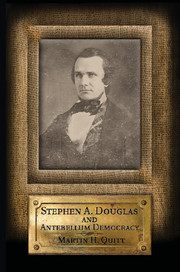Book contents
- Frontmatter
- Contents
- Acknowledgments
- Abbreviations
- Introduction
- 1 Adolescence in Vermont
- 2 Schooling, Learning, and Passing the Bar
- 3 Family Influences, Stress, and Bonds
- 4 Democratic Prodigy in Illinois
- 5 Constitutionalism, Part I
- 6 Constitutionalism, Part II
- 7 The 1860 Campaign and the Code Against Campaigning
- 8 In Lincoln’s Shadow
- 9 Douglas’s Mississippi Slaves
- Appendix Douglas’s Campaign Itinerary, 1860: June 23 to November 6
- Index
- References
5 - Constitutionalism, Part I
Noncitizen Voting, Apportionment, and Internal Improvements
Published online by Cambridge University Press: 05 October 2012
- Frontmatter
- Contents
- Acknowledgments
- Abbreviations
- Introduction
- 1 Adolescence in Vermont
- 2 Schooling, Learning, and Passing the Bar
- 3 Family Influences, Stress, and Bonds
- 4 Democratic Prodigy in Illinois
- 5 Constitutionalism, Part I
- 6 Constitutionalism, Part II
- 7 The 1860 Campaign and the Code Against Campaigning
- 8 In Lincoln’s Shadow
- 9 Douglas’s Mississippi Slaves
- Appendix Douglas’s Campaign Itinerary, 1860: June 23 to November 6
- Index
- References
Summary
Congress might … adopt the Native American creed, with all its narrowness and bigotry and selfishness and injustice; but do what it would, it never could reach the sacred right of suffrage – that was reserved to the states.
Stephen A. Douglas (1845)Antebellum lawmakers at the state and federal levels needed to know the written constitution applicable to their jurisdiction. This was the great legacy of the founders of the Republic: congressmen were obliged to justify their positions in terms of the Constitution. A biography can illuminate the predisposition that a politician brought to his interpretation of the document. Did he honestly search the meaning of the text, or did he seek only obligatory constitutional wrapping for his position? Conversely, did he tailor his proposal in accord with his understanding of the text? Historians ask whether law or politics motivated a judge’s decision. The same question is not asked of politicians, because their political purpose is taken for granted. Their constitutionalism usually is considered mere cover for other interests. Douglas, however, earnestly tried to balance his constitutional values with other political concerns. The Constitution was more than rhetorical packaging for him; it pushed him independently of other pressures. Had he become president, he would have reconstructed the constitutional understanding of territorial rights, either through an amendment or through the sheer force of executive policy. His legislative record over seventeen years in Congress was anchored in his constitutionalism.
Douglas’s route to Illinois had a formative influence on the direction of his constitutionalism. Although he believed that his politics were set in opposition to an employer’s preferences when he was fifteen, the full thrust of his adolescence inclined him toward the federalism of the Democratic Party. Even if his master had favored Jackson instead of Adams in 1828, it remains difficult to imagine him becoming a Whig in the 1830s. That party’s tendency toward centralism and elitism put off Douglas, who defended local control and majority rule. His populism was instinctive, rooted in his coming of age in Illinois.
Information
- Type
- Chapter
- Information
- Stephen A. Douglas and Antebellum Democracy , pp. 87 - 106Publisher: Cambridge University PressPrint publication year: 2012
